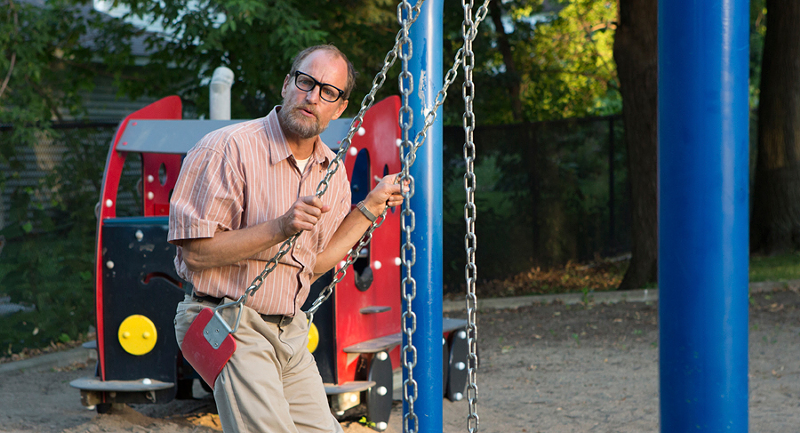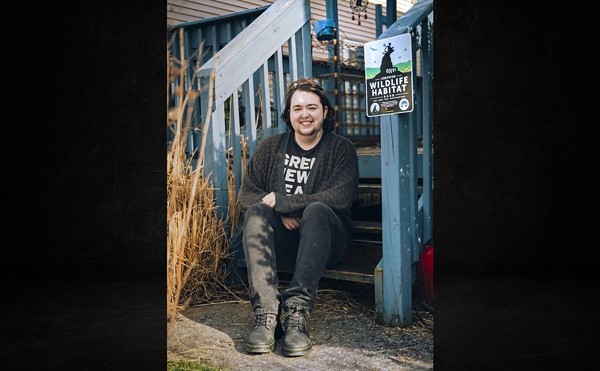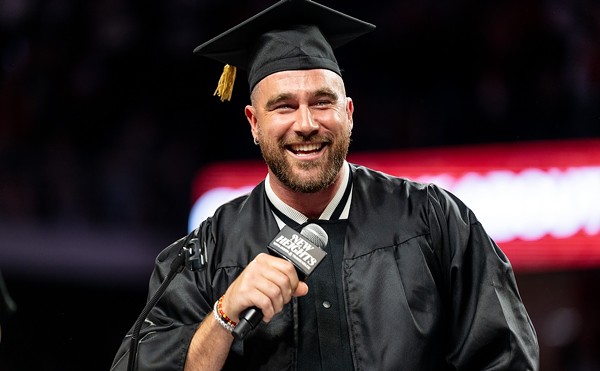Superheroes are seen as modern-day stand ins for the mythic gods of old, but they bear far fewer recognizable foibles than either the Greco-Roman or the Norse pantheons of our cultural roots.
That’s what makes the work of graphic novelist Daniel Clowes so relevant and downright necessary. His framed narratives — long-form comic books like Ghost World and Art School Confidential that capture the desperate lives of idiosyncratic folks on the margins — have served as the basis for films about oddball eccentrics with the unnerving ability to live pathetic lives. While that sounds like a punishing put-down, it should be appreciated as a world-saving badge of honor, worthy of our attention.
Take, for instance, Wilson (Woody Harrelson), the titular subject of director Craig Johnson’s new film based on a Clowes graphic novel and with a screenplay by Clowes. Wilson is a man out of time, stuck in a sick joke of an existence where everyone spends far too much time FaceTiming rather than engaging in real face-to-face encounters. He’s sad and frustrated about this state of affairs, but we quickly realize that because Wilson is such a socially awkward fellow, it wouldn’t matter if everyone put their phones and devices down — he would still be outside the human community looking in.
His attempts to connect are stubbornly off-putting to the point that he pushes everyone away at the very moment he’s trying his hardest to ensnare them in his version of a warm embrace. He is the very definition of an antihero — both the would-be hero and the despicable villain — in one sad sack of skin. Always claiming the space directly next to someone on an otherwise empty bus or train, or choosing to saddle up next to a stranger at the line of urinals and striking up a conversation, Wilson recalls the urgent command of the Police song “Don’t Stand So Close to Me.” He’s the desperate creep.
But when he tracks down his ex-wife Pippi (Laura Dern), who walked out on him years ago and has fallen on hard times, he discovers that she gave up their child for adoption. The idea of having someone out there to remember him and carry on his legacy inspires Wilson to reach out as only he can. His now-teenage daughter Claire (Isabella Amara) is a sullen kid being raised by financially secure but emotionally distant parents, which makes her susceptible to Wilson’s brand of obtrusiveness.
Director Johnson has an affinity for born losers. His 2014 feature The Skeleton Twins revealed the melancholic turmoil faced by a pair of estranged siblings (Bill Hader and Kristen Wiig) who reconnect after surviving separate suicide attempts on the same day. It would have been easy to fall back on the comic sensibilities of the film’s leads, but Johnson pushed them to plumb the depths of the despair that the two characters struggled to bravely face.
He relies on Harrelson to tap a similar vein in Wilson. Fortunately, Wilson as a character, despite having an uncanny ability to accentuate the negative in everyday life to epic levels, remains curiously hopeful. He never fails to cross the divide, winding up nose-to-nose with anyone who strays into his path.
And the role fits Harrelson perfectly, playing to his outsized performance style. There has always been a daring openness to his portrayals, going all the way back to Woody Boyd, the loveable dim bulb of a bartender he played on Cheers. Harrelson surrenders fully to whatever traits have been defined on the page, never simply reading the scripted lines. Instead, he gleefully seeks out the outer limits, pitches his tent and makes himself at home, proving that if you can live that far out, you haven’t lost touch with what makes you human. (Opens Friday at Esquire Theatre.) (R) Grade: B+






